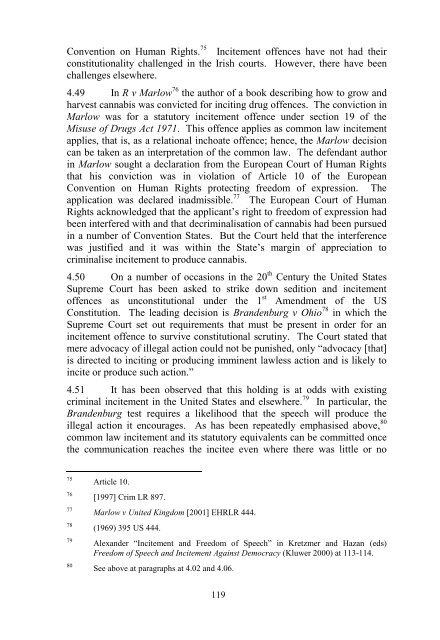Consultation Paper on Inchoate Offences - Law Reform Commission
Consultation Paper on Inchoate Offences - Law Reform Commission
Consultation Paper on Inchoate Offences - Law Reform Commission
You also want an ePaper? Increase the reach of your titles
YUMPU automatically turns print PDFs into web optimized ePapers that Google loves.
C<strong>on</strong>venti<strong>on</strong> <strong>on</strong> Human Rights. 75 Incitement offences have not had theirc<strong>on</strong>stituti<strong>on</strong>ality challenged in the Irish courts. However, there have beenchallenges elsewhere.4.49 In R v Marlow 76 the author of a book describing how to grow andharvest cannabis was c<strong>on</strong>victed for inciting drug offences. The c<strong>on</strong>victi<strong>on</strong> inMarlow was for a statutory incitement offence under secti<strong>on</strong> 19 of theMisuse of Drugs Act 1971. This offence applies as comm<strong>on</strong> law incitementapplies, that is, as a relati<strong>on</strong>al inchoate offence; hence, the Marlow decisi<strong>on</strong>can be taken as an interpretati<strong>on</strong> of the comm<strong>on</strong> law. The defendant authorin Marlow sought a declarati<strong>on</strong> from the European Court of Human Rightsthat his c<strong>on</strong>victi<strong>on</strong> was in violati<strong>on</strong> of Article 10 of the EuropeanC<strong>on</strong>venti<strong>on</strong> <strong>on</strong> Human Rights protecting freedom of expressi<strong>on</strong>. Theapplicati<strong>on</strong> was declared inadmissible. 77 The European Court of HumanRights acknowledged that the applicant‟s right to freedom of expressi<strong>on</strong> hadbeen interfered with and that decriminalisati<strong>on</strong> of cannabis had been pursuedin a number of C<strong>on</strong>venti<strong>on</strong> States. But the Court held that the interferencewas justified and it was within the State‟s margin of appreciati<strong>on</strong> tocriminalise incitement to produce cannabis.4.50 On a number of occasi<strong>on</strong>s in the 20 th Century the United StatesSupreme Court has been asked to strike down sediti<strong>on</strong> and incitementoffences as unc<strong>on</strong>stituti<strong>on</strong>al under the 1 st Amendment of the USC<strong>on</strong>stituti<strong>on</strong>. The leading decisi<strong>on</strong> is Brandenburg v Ohio 78 in which theSupreme Court set out requirements that must be present in order for anincitement offence to survive c<strong>on</strong>stituti<strong>on</strong>al scrutiny. The Court stated thatmere advocacy of illegal acti<strong>on</strong> could not be punished, <strong>on</strong>ly “advocacy [that]is directed to inciting or producing imminent lawless acti<strong>on</strong> and is likely toincite or produce such acti<strong>on</strong>.”4.51 It has been observed that this holding is at odds with existingcriminal incitement in the United States and elsewhere. 79 In particular, theBrandenburg test requires a likelihood that the speech will produce theillegal acti<strong>on</strong> it encourages. As has been repeatedly emphasised above, 80comm<strong>on</strong> law incitement and its statutory equivalents can be committed <strong>on</strong>cethe communicati<strong>on</strong> reaches the incitee even where there was little or no757677787980Article 10.[1997] Crim LR 897.Marlow v United Kingdom [2001] EHRLR 444.(1969) 395 US 444.Alexander “Incitement and Freedom of Speech” in Kretzmer and Hazan (eds)Freedom of Speech and Incitement Against Democracy (Kluwer 2000) at 113-114.See above at paragraphs at 4.02 and 4.06.119
















